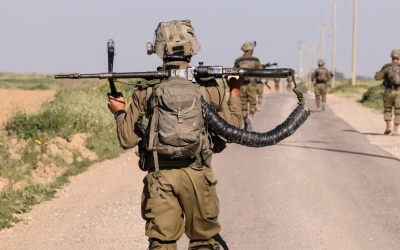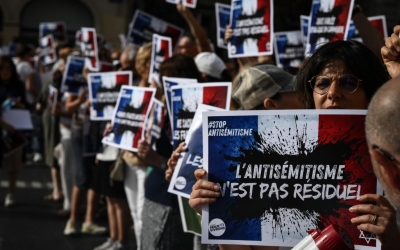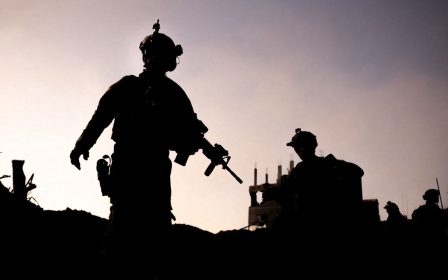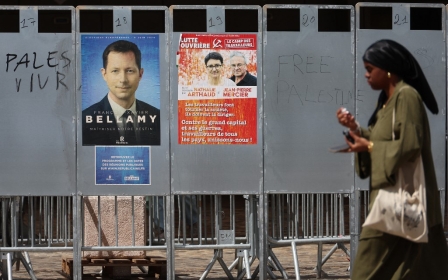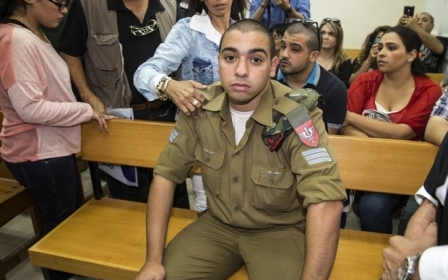War on Gaza: Can the complaint against a French-Israeli soldier accused of torture succeed?
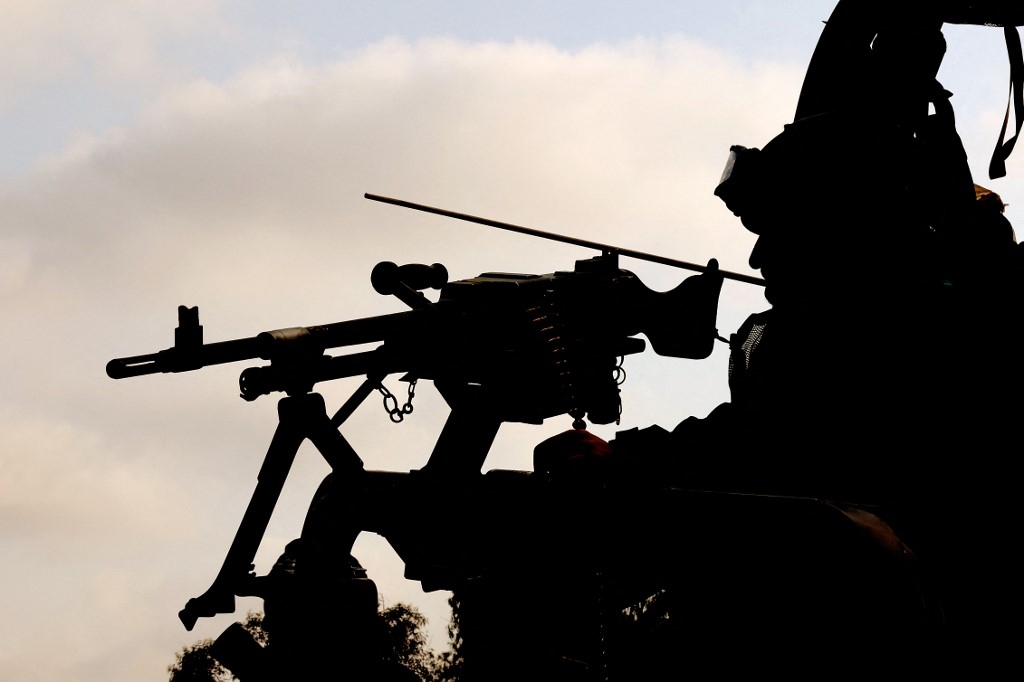
What will be the outcome of the complaint filed on 17 April by three NGOs before the French anti-terrorism prosecutor’s office in Paris against a French-Israeli soldier for alleged crimes of torture and acts of barbarism in Gaza?
The soldier, who is believed to be from Lyon, in east-central France, has been identified as the author of a video posted on social media at the end of March that has sparked outrage and condemnations.
The video purportedly shows Israeli soldiers making Palestinian detainees get off a truck. The prisoners, believed to have been kidnapped in Gaza, are blindfolded and dressed in white jumpsuits. Some have their suits undone and appear shirtless.
One can hear the person filming the video insulting them in French: “fuckers”, “sons of bitches”, “motherfuckers”, “bunch of bitches”.
“You saw those little sons of bitches there, look, he pissed himself,” the French-speaking man says.
New MEE newsletter: Jerusalem Dispatch
Sign up to get the latest insights and analysis on Israel-Palestine, alongside Turkey Unpacked and other MEE newsletters
“Look, I’m going to show you his back, you’ll laugh. Look, they tortured him to make him talk. You were happy on 7 October [day of the Hamas-led attack on Israel], you sons of bitches.”
The complaint, read by Middle East Eye, states that the soldier filmed "Palestinian prisoners in a degrading situation and mentioned acts of torture”.
“This video reveals the commission of torture and war crimes, anchored in a context of military aggression of a genocidal type by the Israeli army and the generalisation of the use of torture,” the referral adds.
<>
According to Gilles Devers, one of the claimants’ lawyers, the soldier who filmed the video is not only guilty of apology for torture, but of psychological torture by inflicting, through insults and degrading words, inhuman and bestial treatment on prisoners.
“International law considers physical torture on an equal footing with other acts that place individuals in a position of inferiority,” the lawyer told Middle East Eye.
Two days after the complaint was filed, a meeting took place at the prosecutor's office in the presence of the attorneys.
“Two deputy prosecutors received us and seemed interested in the case. They asked us to provide them with other elements for the identification of the soldier. That is what we did,” Devers added.
The claimants could file a civil case
Among the documents included in the file is an interview that the soldier gave to an Israeli television channel after his video was broadcast on the internet.
“The soldier clearly identified himself,” according to Devers.
“It remains to be seen what the prosecution will decide. If the latter, ultimately, does not take the initiative to start an investigation itself, the complainant NGOs will file a civil case to trigger the investigation process,” the lawyer told MEE.
Johann Soufi, international law expert and advisor to the International Criminal Court (ICC), warns however that “article 2-4 of the code of criminal procedure requires organisations wishing to institute a civil action to demonstrate five years of existence in the fight against war crimes or crimes against humanity. This is the case, for example, of the FIDH [International Federation for Human Rights], Amnesty International, or Human Rights Watch.”
These obligations must therefore be fulfilled for the complaint to be accepted, the lawyer told MEE. However, two of the three applicant NGOs are not entirely admissible, according to him.
The March 30 Movement was registered under Belgian law in October 2023, a few days after the launch of the Israeli offensive in Gaza following the deadly attack led by Hamas.
Al Jaliya Association of Palestinians of France, created in 2018, is an organisation that has no prior experience in combating war crimes.
Only Justice et droits sans frontières (JDSF) ticks all the boxes. The NGO was founded in France in 2019 to sue human rights violators.
“By filing a complaint, the leaders of these associations first acted as citizens wishing to alert the justice system about serious facts involving a French national,” Devers noted.
‘French justice is competent’
According to Soufi, even in the absence of a formal complaint, there is sufficient evidence to trigger a criminal investigation.
“The suspect is French. He is accused of having committed crimes punishable by international law and French law,” he told MEE.
“There is therefore no reason for the judicial authorities not to launch investigations into these facts, based on the information currently available in the public field as well as the referral requested by French deputies,” he added, referring to the complaint filed by France Unbowed (LFI) MP Thomas Portes after the release of the incriminated video.
‘There is no reason for the judicial authorities not to launch investigations into these facts’
- Johann Soufi, legal expert
The legal expert explains that article 40 of the code of criminal procedure requires any elected political official (mayor, deputy, senator, etc.) to initiate legal action if, “in the exercise of his/her functions, he/she acquires knowledge of a crime or misdemeanour".
“This is what was done against this individual,” Soufi said.
In December 2023, Portes had already called on the Ministry of Justice to take to court all dual nationals suspected of war crimes in Israel and the Palestinian territories.
He reiterated his request in early May, after retweeting a message from his party colleague Rima Hassan, concerning another soldier, whom she identified as French-Israeli, who threatened to “destroy, burn and kill” in a message on X.
“For months we have been warning about the presence of 4,000 French-Israelis alongside an army that is committing genocide. France can no longer remain silent and must open investigations to take to court those who participated in this massacre,” Portes wrote.
In January, the International Court of Justice found a “plausible” risk that Israel is committing genocide in Gaza.
The French government first dodged the issue, stating that France would not investigate its nationals enlisted in the Israeli army because “dual nationality is a double allegiance”.
Then, on 21 March, when asked during a press briefing if the authorities were planning to carry out investigations into the French-Israeli soldiers potentially guilty of war crimes in Gaza, the deputy spokesperson for the Ministry of Foreign Affairs, Christophe Lemoine, acknowledged that “French justice is competent to recognise crimes committed by French nationals abroad, including in the context of the current conflict”.
Under the penal code, French citizens who are responsible for crimes or offenses abroad can be prosecuted.
For Soufi, “there is a sufficiently high probability that French people are involved in international crimes [in Gaza and the occupied West Bank], in one way or another”.
This possibility, he said, “triggers the obligation for the French [judicial] authorities to investigate these facts and the potential involvement in these crimes of all our nationals who return from Gaza".
This obligation results from the Geneva Conventions, from France being a signatory to the Rome Statute which created the International Criminal Court, but also from customary law, he explained.
In 2021, the ICC launched a formal investigation into allegations of war crimes and crimes against humanity allegedly committed in occupied Palestine since June 2014.
ICC Prosecutor Karim Khan said last October that the court had also jurisdiction to try alleged war crimes and crimes against humanity committed by Hamas in Israel and by Israelis in Gaza during the current war.
In May, Khan requested arrest warrants against Israeli Prime Minister Benjamin Netanyahu, Defence Minister Yoav Gallant, and three senior Hamas leaders in this context.
‘Instrumentalisation of procedures’
Why, then, have the French courts not taken any action until now? Despite its reputation as the “fourth power”, justice, according to Johann Soufi, is not completely independent in France.
“One of the problems that criminal law experts have noted for a long time is the hierarchical dependence of the public prosecutor’s office [responsible for defending the interests of the society and the application of the law] on the executive power, more particularly on the justice minister,” he said.
“This is chiefly what pushed the European Court of Human Rights, in 2010, to deny the French prosecutor the status of judicial authority.”
In several judgments rendered that year, the Strasbourg Court considered that the French public prosecutor is not authorised by law to exercise judicial authority as it is not independent of the executive power.
‘One of the problems that criminal law experts have noted for a long time is the hierarchical dependence of the public prosecutor’s office on the executive power’
- Johann Soufi
Prosecutors in France are currently appointed by the Council of Ministers and dismissible by the government.
They may also receive instructions from the Ministry of Justice.
“What is needed is a totally independent public prosecutor’s department, an effective separation of judicial and executive powers,” Soufi emphasized.
According to him, there is “an instrumentalisation of procedures and legal questions linked to the conflict [in Israel-Palestine]”.
The issue is all the more sensitive now ahead of the snap parliamentary vote requested by President Emmanuel Macron after his party’s defeat in the 9 June European elections, as it could see a victory of the far-right National Rally, a party which has presented itself as a staunch supporter of Israel.
The war in Gaza has been a sensitive topic during both the legislative and the European campaigns.
Elsewhere in the Netherlands, legal actions have been taken against Israeli-Dutch soldiers accused by the March 30 Movement of "having participated in acts of genocide and other crimes against the Palestinian people" in the Gaza Strip and the West Bank between October 2023 and February 2024.
However, the Dutch public prosecutor rejected these complaints last April.
In France, the anti-terrorism prosecutor’s office, responsible for war crimes, has three months to make its decision about the admissibility of the complaint. If the procedure started by the three NGOs succeeds, it could create a precedent.
Translated from MEE French edition (original).
Middle East Eye delivers independent and unrivalled coverage and analysis of the Middle East, North Africa and beyond. To learn more about republishing this content and the associated fees, please fill out this form. More about MEE can be found here.


